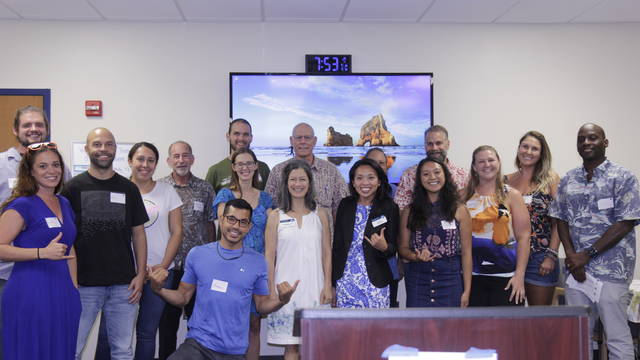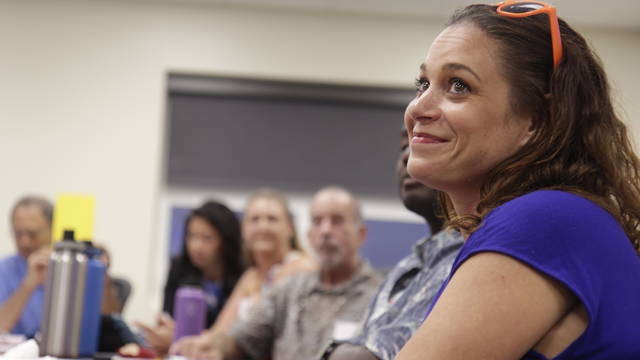Raise a glass: Kona Toastmasters empowers communication, inspires self-discovery

Kona Toastmasters, both veterans and newcomers, pose for a photo after an open house event Tuesday. (Courtesy photo/Desi Foxe)

Kelly Dockrell enjoys a speech at the Kona Toastmasters open house event Tuesday. (Courtesy photo/Desi Foxe)
KAILUA-KONA — Desi Foxe, a recent Toastmasters recruit, recalled the first description he ever heard of the club as a “support group for public speaking.”
KAILUA-KONA — Desi Foxe, a recent Toastmasters recruit, recalled the first description he ever heard of the club as a “support group for public speaking.”
I didn’t find it to be that, exactly.
* An introduction
I had a vague sense of what I was walking into as I climbed the stairs of the Hale Iako Building at the Natural Energy Laboratory of Hawaii Authority Tuesday night, entering the conference room where Toastmasters is held from 6-7:30 p.m. on the first and third Tuesdays of every month.
I’d heard a bit about this international nonprofit organization with hundreds of thousands of members in countless chapters spanning scores of countries. In the most simplistic sense, Toastmasters is about becoming a better public communicator — gaining confidence through experience.
Hearkening back to the story Foxe told about Toastmasters as a support group for public speaking, there is some validity to that. People spoke and, yes, they were supported. Clapping after the introduction of each speaker and at the conclusion of each speech is Toastmasters modus operandi.
Part of every Toastmasters meeting is a section called table topics, where the Toastmaster his or herself tosses out a random, or possibly theme-related, question or scenario, picks someone from the group and more or less says “Go.”
You’ve got to speak for 30 seconds. You can’t speak for more than two minutes. There’s a timer keeping track. Structure is important in this club, one side of an ironic dichotomy held in juxtaposition to the improvisational, impromptu nature of the speech content itself.
The night I visited was unique, an open house, and worked a little differently than it would have normally. Participants were divided into teams competing in a jeopardy-themed game — pick a category and roll.
There’s also a designated Ah/Grammarian, what I might describe in layman’s terms as the “um police.” Filler words are discouraged in Toastmasters, and never are filler words more relied upon than when one is thrust into mandatory discussion on a topic not yet prepared for.
Toastmasters is about learning fast and thinking on your feet. It creates a paradigm in which the speakers learn a great deal about themselves and each other in a short period of time — assuming they’re paying attention to the right things.
* Diving in
The group wasted little time throwing me into the fire and decided as a visitor planning to write a first-person narrative on the experience, I ought to speak first. The feeling that accompanied me at the podium was one I imagine tennis players in the Wimbledon Final or golfers on the back-9 at Augusta experience on Sunday.
A man on an island. Sink or swim.
I stood looking out at an array of faces representing just about every demographic you can imagine, and began yammering. The question I was posed, in a nutshell, was would I rather have one wish granted today or 10 wishes at my disposal a decade from now?
I’ve been described, accurately, as boisterous yet perpetually teetering on the edge of obnoxious. I’ve never had a problem engaging, and often connecting with, people I’ve only just met. Most of my life, I’ve wanted to be the center of attention, reveled in the spotlight. And since athletic ability and good looks were never going to keep the spotlight on me, running my mouth is and always has been my best option in this regard.
However, as I stood in front of a group of strangers pondering a random, silly question — my heart rate moderately elevated, much to my surprise — the obvious answer eluded me. Any answer did, really.
I found myself with a choice — evade the question, make it about something else, or tackle the question head on. When your mind draws a blank, when you can’t conjure up bull crap to fill the seconds and grab a giggle, you resort to the only place you can. The truth.
I talked about how I’d wait 10 years. A patient optimist, assuming I’d still be alive by then, the payoff in the end is greater than immediate satisfaction. I didn’t expect this was how I felt, but it was. That was the first thing I learned about who I am.
During the moments of truth a program like Toastmasters provides, you make a choice, either evade the question or be totally honest. Like I said, Toastmasters teaches you a lot more than how to speak in public. It teaches you about who you are. And if you’re the kind of person who doesn’t evade, it teaches you even more.
I, for instance, learned that one of my 10 wishes would be that I was funnier and more charming during my speech. I gave voice to that sentiment, and it might have been the only laugh I got all night.
* A layered experience
That first trip to the podium taught me a lot about Toastmasters and a lot about myself. My failure to deliver the way I wanted made it all too clear to me how important it is that I be seen as an intelligent, clever, funny individual — that those are the avenues by which I can command respect and admiration from the people around me.
By way of those exact personal revelations, Toastmasters also taught me about my insecurities. But it was a safe space, and I appreciated the opportunity it provided as well as those in the audience who didn’t judge, just laughed and clapped and supported.
Toastmasters can be different things to different people. For me, it was a journey of self-discovery. For Kelly Dockrell, a former member of the club in Florida who attended the Kona open house Thursday for the first time since moving to Hawaii Island, Toastmasters is a megaphone of sorts.
“This is the type of place where people come to edify and feel confident about themselves,” she said. “I feel as though I have a voice. I have a message I want to proclaim. Toastmasters is a platform in order to learn how to speak efficiently to an audience and deliver that message.”
Another element of each Toastmasters meeting is a full speech given by one member at the end of every meeting. The speech is evaluated by another member of the group and provides an opportunity for constructive feedback and growth as a truth-telling communicator.
Emily To, president of the Kona Toastmasters chapter, has competed in statewide competitions in this format. She fell one round short of the international competition and talked Tuesday about what that experience meant to her.
“The best part about it was the network,” To said. “I had people come up to me and tell me my speech was so powerful, that they were inspired. And how it affected them influenced how they affected me. It meant something.
“Words are powerful.”



Great writeup of the Toastmasters, but… Max is one of the best (and few) reporters on this island. Is this really the best use of his time?
Yes, to me, I see it as a great use of his time! Spending a few hours to both learn more about yourself and what it’s like to be a public speaker (empathy-building) is a wonderful type of empowerment for anyone. And for a reporter for a widely read publication, it’ll make him an better reporter in the long run. On top of that, personal journaling in public – not just in one’s own diary – shows his willingness to be vulnerable. And that’s good, too. It’s not gig, it’s a reporter’s adventure as much as reporting. Once in a while, it’s a great thing to share, I believe. 🙂